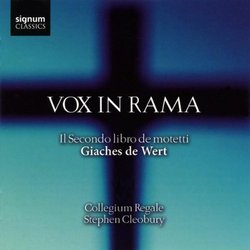| All Artists: Giaches de Wert Title: Giaches de Wert: Vox in Rama - Il Secondo libro de motetti Members Wishing: 0 Total Copies: 0 Label: Signum UK Original Release Date: 1/1/2008 Re-Release Date: 10/28/2008 Album Type: Import Genre: Classical Styles: Opera & Classical Vocal, Chamber Music, Historical Periods, Classical (c.1770-1830) Number of Discs: 1 SwapaCD Credits: 1 UPC: 635212013120 |
Search - Giaches de Wert :: Giaches de Wert: Vox in Rama - Il Secondo libro de motetti
 | Giaches de Wert Giaches de Wert: Vox in Rama - Il Secondo libro de motetti Genre: Classical |
Larger Image |
CD Details |
CD ReviewsA voice teacher and early music fan George Peabody | Planet Earth | 06/18/2009 (5 out of 5 stars) "GIACHES DE WERT (1535-1596)PROGRESSIVE AND EXPRESSIVE COMPOSER.
The Flemish-born De Wert was one of many foreigners to dominate the Italian music scene in the mid to late 16th Century, being Director of Music at Mantua. He is known for his books of madrigals, ten of which were published during his lifetime. Therefore, in this capacity he had a strong and lasting influence on the next generation of composers such as Monteverdi. However, because his output of sacred music is small, (only three books of Motets, the second of which is on this disc) it tends to be ignored. Fortunately for us, it is slowly coming to light and being recorded by such quality singers as those on this disc. These Motets bear the traces of Wert's skills as a composer of Madrigals: vivid word-painting, telling use of chromaticism, wide voice range, declamatory passages, and a tendency to make the lower voices accompany the upper. More than any other composer he translated text into music, and in this respect he could be compared to his contemporary Orlando Lassus. There are several in this second book that demonstrates this practise such as 'Benedicta sit senet a Trinitas' It contains much homophony, which reflects that part of the text that stresses the 'undivided unity of the Holy Trinity'. The homophony is used to single out the important elements of the text,like the passage in St.Paul's letter to the Philippians, set to music in 'Hoc enim sentite in vobis' where the apostle states that Jesus 'humbled himself, becoming obedient unto death, even the death of the cross'. Ascending and descending figures are used to illustrate the text, the ascending indicating joy & ecstasy 'Gaudete in Domino''Rejoice in the Lord, always....'; the descending to indicate sadness 'Jerusalem, Jerusalem''your house shall be left to you desolate'. Much variation in rhythm, lively and steady with sudden drastic changes creating strong contrasts. This recording is aptly named 'Vox in Rama', for not only is it one of Wert's most famous Motets, it is the most expressive, containing much use of chromaticism and dissonance, that is not contained in any of the other Motets. However, it is most appropriate in this Motet to create a dark sombre mood, for the setting is in the gospel of St. Matthew about the 'Massacre of the Innocents': "A Voice in Rama was heard, lamentations and great mourning, Rachel bewailing her children, and would not be comforted, because they are not." On this recording, unfortunately, the instrumental Canzonas that were often a part of the Mass in that era, are not included. BUT we do have the very excellent voices of Collegium Regale, a group of the sixteen scholars from the King's college Choir, Cambridge, and they have done full justice to this music. Both the rich polyphonic structure as well as the exquisite expression of single words or phrases in the text are well realized here. The Ensemble, under the direction of Stephen Cleobury, produces a lovely sound, and the syle of the singing as well as the recording technique, definitely superior in quality. The booklet contains informative program notes and lyrics with English translation. " |
